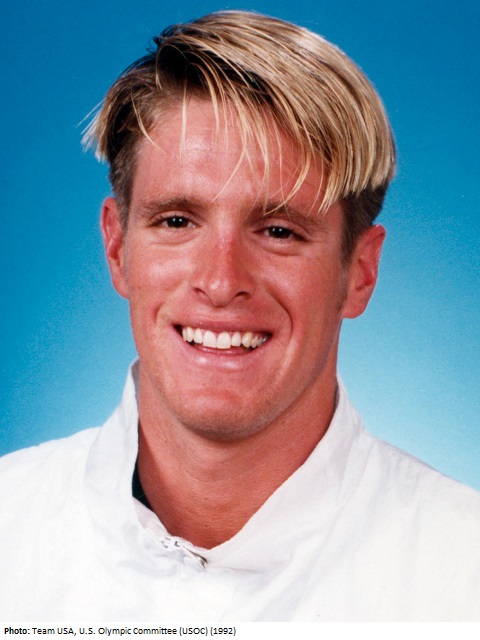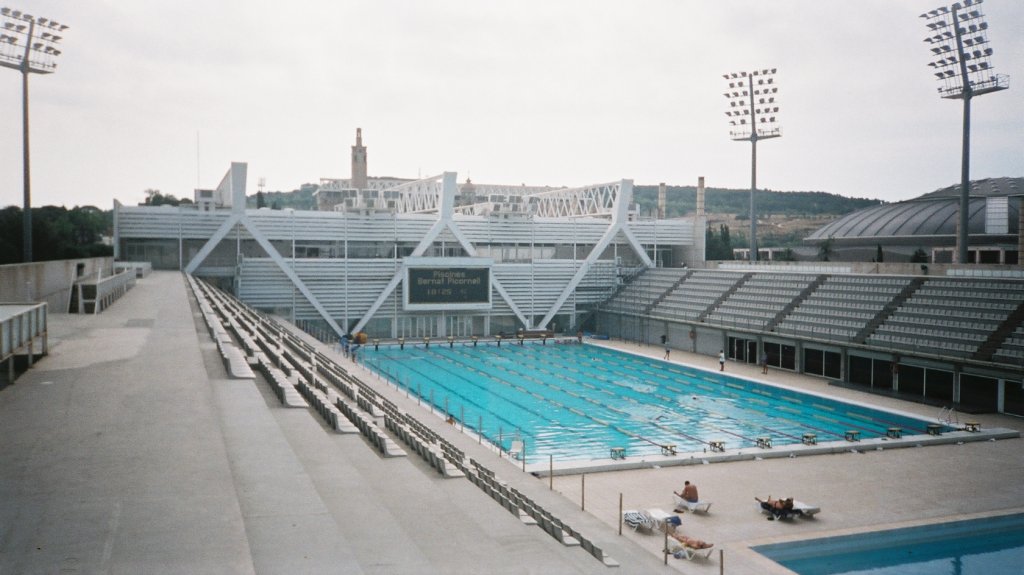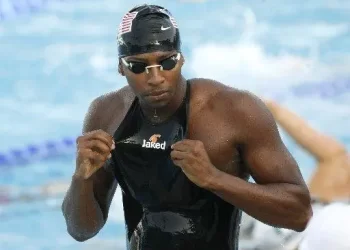By: Zachary Draves
Tough, tenacious, and triumphant is possibly the best way to describe 1992 Olympic swimmer Lawrence Keith Frostad.
Among the pool of talent that swam in Barcelona that year, of which there was an abundance of future legends, Jenny Thompson, Summer Sanders, and Crissy Peham, Keith or Lawrence as he is referred to in the swimming world, engaged in quite a journey to solidify his place on Team USA.
Keith has quite a resume to latch onto including being a five-time national champion for the University of Miami, Florida, three in the 1500-meter freestyle, one in the 800-meter freestyle, and one in the 400-meter freestyle.

(Courtesy: Team USA)
He ultimately made it to Barcelona and competed in the men’s 1500-meter freestyle and finished seventh overall with a time of 15:19.41. Even without a medal, how many can say that they got the chance to compete on the world’s stage among the best of the best?
Plus be able to take a picture with Magic Johnson

(Courtesy: Keith Frostad)
In the years since, Keith has continued to amaze, such as surviving an attack from a group of skinheads in Boston in 1996 to afterwards winning the US title in the 800 freestyle that same year. Even though he didn’t make the Olympics in Atlanta, he nevertheless overcame tremendous odds to prove that he was still a viable force in the water.
Eventually, he became a swim coach and is currently a derivatives manager with State Street in Long Beach California.

(Courtesy: Keith Frostad)
His journey to get to that Olympic stage included much sacrifice and intensity, but unfortunately it also included experiencing some vicious acts of torment, harassment, and isolation due to the fact that Keith is an openly gay man, one of the first openly gay Olympians nonetheless, at a time when it was particularly precarious to say it loud and proud and especially in competitive sports.
A story that he has not told until now.
In this Nuts and Bolts Sports exclusive, Keith shares with me what he went through in the lead up to the Barcelona games, his thoughts on the current state of LGBTQ+ rights, and what he hopes others will learn from his story.
Why are you now ready to share your story?
Well as being one of the first openly gay Olympians, I didn’t have much power back then. I was sort of silenced back then. But now I have more power and now no one can silence me and I can tell what really happened with me back then. I can tell a story about my experiences as a gay Olympian. I was talking to some people about this, some of my friends, they said “you need to let it go” “you need to forget it”. The problem with forgetting this is that people have a tendency to repeat them if it’s forgotten. So that is one of the reasons I wanted to let people know that gay people are here, there is nothing wrong with being gay, and that is why I wanted to tell my story.
Did all this happen during your time in Barcelona?
Yes. I came out in 1991 at the World Championships. I was training with the Women’s Texas Longhorns Aquatics with (Coach) Mark Schubert and they were great. The girls there protected me but the guys on that team were really rough. I was in their locker room for about three days before they were like “we can’t handle him being in here”. So I moved to the public locker room, which was fine, I was more comfortable there anyway. There were a couple of guys on that team that made my life very miserable. I remember one practice I was leaving with Amy Shaw. We were leaving the swimming pool and out onto the parking lot and one of the male swimmers tried running me over, apparently you got ten points for running a gay guy over. It was that sort of thing and someone keyed “f*****” in my car.
People were shooting paint pellets at me from bushes when I’d leave, so it was not easy. Some of the guys were great, some of them were nice, there were just a couple that really let me have it. What’s interesting is that I was at a swim meet in 2016, I was helping a local team with their distance program in Thousand Oaks, and a couple of coaches came up to me just to say “what are you doing with your kids, your kids are killing it at the meets?” I was telling them what I was doing and there was this weird awkward silence where you know they wanted to ask me something about the Olympics or being gay or something. One of them finally said “I heard it through the grapevine that you went through alot swimming back then” and the other coach said “yeah I wanted to say something but I didn’t know how to say it”. They asked me about it and I said “yeah it is not easy being out”. The 91 nationals I was getting ready for my quarter meter final and in the locker room there were these rows of lockers and I was in one just getting ready a couple rows down, a couple of swimmers were like “hey who’s in the final?” and they mentioned a few names and they said “Frostad”.
One of them said “you are not going to let that f***** beat you?” and the other guy said “well that f***** is pretty fast”. People next to me in my row knew who I was and looked at me for a response and I didn’t say anything. I ended up winning the race and winning the 400 meter free. It was that sort of the thing and biggest one was the Olympic Trials and I was in Lane 3 getting ready and as I was getting on the blocks, there was someone in the diving row and he said “Lawrence, you’ll never make it f*****, you’ll never make it”. The timers looked at me to see what I was going to say and I didn’t say anything and I just swam and ended up making it. The timers then said how proud they were of me and that they worried that I wasn’t going to make it because of that. The male timer especially said “I was really proud of you that you were able to pull this out”. For that guy, who I had never seen before, I looked for him afterwards and he was nowhere to be found. I still made the team but it was not easy being gay.
Going back to 2016 where these coaches in Thousand Oaks were talking to me, he said “I think things are different now” and I said “why is that?” he said “well I bring your name up alot because we have swimmers on our team who are out and I always say how tough you were, how strong you were.” I said to him “that’s great” and the other coach said to me that he had a swimmer who had just come out, he’s only 12 years old. I said “that’s great, are you all supportive?” and they said “everyone’s supportive”. So I think now things are changing and I had a few Facebook messenger posts from people apologizing for how they treated me and one who apologized, I didn’t even know he was doing it, said that he did it behind my back which was even worse. I said to him “what changed?” he said “well I have someone close to me that has come out and I don’t want him to be treated the way you were treated.” So I think over time people are realizing that there are gay people in this world and that we are not all bad people and I think people are afraid of the unknown. When you know somebody or have someone in your family who is gay, it makes things easier.
So when you got to Barcelona, did any of those behaviors occur?
Yes. After we made the Olympic team, we went to Tampa for processing to get all of our equipment. I want to be very clear here, this was not USA Swimming who did this, I was approached by two people one was a man and one was a woman from the United States Olympic Committee. They said “we here you have come out” and first I thought they were going to congratulate me and they were like “Lawrence we want to remind you, the Olympics is a sporting event not a political event”. I said “are you threatening me? I made this team fair and square”. He said “as long as you swim and don’t make any political statements you will be fine”. Right after that, there were guys on the patio talking about room assignments for the Olympic team and one of them said “who’s gonna room with Frostad?” and one of them said “I’m not rooming with him because I don’t want to wake up at 2:30 in the morning to him molesting me”. That is what I had to put up with. Luckily I had a great roommate. He was a wonderful, first class guy. But that is stuff I had to deal with that other people didn’t mentally when people think I am going to molest them at 2:30 in the morning. Really? come on. So I had a lot of extra issues to deal with.
At the time, when all of this was going on or after you came home, was there anybody that you could talk to?
I had some good gay friends in Austin, Texas. There were some tennis players, baseball players, golf players and they weren’t out yet but we’d go to clubs together and we all had each other’s back. I also had some straight friends that were really good to me and they knew what I had gone through but I think back then I had some good friends. Plus, I had the UT women’s team behind my back and those ladies protected me alot and loved me regardless and I love them to this day.
That leads me to this question, is there anybody from the team that you still keep in contact with that supported you or even those that were harassing you?
Yes. One of the male swimmers who apologized to me I have kept in touch with. But I am friends with everyone on Facebook still and everyone’s lives are busy and I completely get it. Those ladies (UT) really protected me BJ Bedford, Janet Evans, Eric Hanson, Katie Dorsey, they all protected me and I can’t thank them enough. I wouldn’t have probably made it without them.
Who were the LGBTQ athletes that you looked up to?
Back then it was a thin amount of people because Greg Louganis wasn’t out in 1988 he came out after. Bruce Hayes came out a little bit after too. I really relied pretty much on myself and to be honest with you there were some other swimmers that didn’t make the Olympic team that really set the way for gay swimmers. Ian Moll for instance and I hope he doesn’t get mad for me mentioning him but he really was the trailblazer for us all. He came out early and took a lot of abuse from his college and other swimmers but he set the way for all of us.
When you look at today and you are seeing states like Texas and Florida that are ratcheting up anti-LGBTQ rhetoric and policy, what do you make of all that?
That’s a tough one. The “Don’t Say Gay” bill it’s out there, it’s passed already, and I think again that people are afraid of what they don’t know or they don’t understand. It’s always been like that and I think it’s still to this day. It becomes easier for people and more relatable when they actually know someone, when they see a gay person and say “he’s human, he’s just like me. He pays his taxes. He has a job. He drives a car.” It becomes relatable once they know someone. That is the important thing. These bills in a way sort of prevent that from happening if you don’t talk about it. That is my concern.
What is your advice to other LGBTQ athletes who want to learn from what you went through, find their place in sports, and be who they are?
Well I think it is really important to come out when you are ready. Coming out is important because it shows how strong and courageous you are and gives hope to others. I can tell you now that I am glad I came out and being gay is who I am but I want people to come out when they are ready. The world is a different place now than it was when I was swimming. They shouldn’t be afraid as much anymore. There’s people here that support you, love you, and who believe in you. I am one of those people. I am one of those people who say it gets better, part of that It Gets Better campaign. It does get better, you just have to believe it and you have to hang in there.


 NFL
NFL





